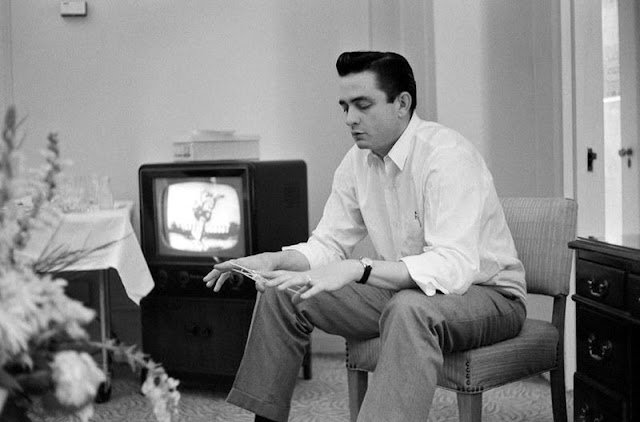Today’s biography feature is all about country music legend, Johnny Cash.
Born February 26, 1932 in Kingsland, Arkansas, to sharecroppers in the middle of the Great Depression, Johnny Cash built an everlasting legacy all on his own. Coming from a large family and being the fourth born out of seven children, the Cash’s knew struggle well. They moved to Dyess, Arkansas when Johnny was 3 to take the Roosevelt administration up on an offer to relocate to Northeastern Arkansas where the soil was more fertile.
Growing up working on the family farm and spending evenings listening to his mother play guitar shaped Cash into the man he grew up to be. Writing poetry and stories occupied Johnny’s free time at the age of 12 and entering himself into talent shows to perform for anyone willing to pay attention soon followed.
At 19 years old, Johnny Cash joined the Air Force. After leaving Arkansas for Texas to complete training, he served as a Morse code operator in Germany intercepting Soviet Army transmissions. Germany changed the trajectory of Johnny’s life for one major reason – it was there that he learned to play the guitar. During this period, he and fellow servicemen started a band and entertained local Germans and GIs through music. Cash served for four years and returned to Texas when his contract expired to get married and take on Memphis, Tennessee. Upon arrival to Tennessee, Johnny studied to become a radio announcer, taking advantage of his G.I. benefits to attend a course while supporting himself through appliance sales.
1954 is the year Johnny Cash succeeded in forming a working relationship with the infamous Sun Records. His audition for the label founder, Sam Phillips, consisted of singing Gospel prompting Phillips to provide the following feedback: “Go home and sin, then come back with a song I can sell.”
While Johnny Cash will always have a connection to country music and the legacy of it, there was also a time when he dabbled in the world of folk. He formed a companionship with Bob Dylan and explored alternative creative directions in the 1960s. This is also the decade that saw the “Man in Black,” as Cash was often referred to as, vocally fight for penal reform shedding light on the poor living conditions of inmates within the American prison system. Prison reform was a passion of Johnny’s. Over the course of three decades, he performed at numerous prisons, donated to the cause, and most notably, helped a Folsom Prison inmate named Glen Sherley get his music out to the world. Cash later achieved his goal of getting Sherley released from prison and did his best to mentor the fellow musician.
That “Man in Black” title Cash was adorned with was explained after-the-fact by himself through song – “Man in Black” features the following lyrics and more.
“I wear the black for the poor and the beaten down
Livin’ in the hopeless, hungry side of town
I wear it for the prisoner who is long paid for his crime…”
A friend of Johnny Cash, Mark Stielper, is on record sharing that “he thought the prison system was broken because it wasn’t fixing anybody.” Stielper is also quoted saying “The population was mixed, kids and killers. This was his thing; he was really bothered by that.” At this point in history, and even up until very recently, there have been few high profile public figures publicly sharing their passion for prison reform. 1972 saw Cash testify in front of Senate over the need to keep young offenders separate from adult inmates and the treatment of freshly freed prisoners.
The motivation for change didn’t end with the morally troubled. There are many songs of his detailing the history of Native Americans and the settler violence they were met with in America’s history. An album released post “I Walk The Line” success was denied promotion for being “too radical for the public.” That album was called Bitter Tears: Ballads of the American Indian. Cash took all of the promotions upon himself despite the negative reactions of his label. It eventually landed at number 3 on the country music charts.
The personal life of Johnny Cash is well documented. He was married twice and had five children. Johnny’s first marriage to Vivian Liberto produced four daughters – Roseanne, Kathy, Cindy, and Tara Cash. The fifth of his children, his first and only son, John Carter Cash, was born March 3, 1970 to he and his second wife, June Carter Cash, of the famous Carter family. Johnny’s marriage to June lasted until 2003, the year they both passed away.
Johnny Cash died on September 12, 2003 in Nashville, TN due to diabetes complications. It is rumored that his final words were “I hear the train a-comin’.”
Johnny Cash Roles You May Recognize:
If you wish to continue learning about Johnny, the following resources are readily available for you to visit…
Podcasts:
Books:
There are many books written on the life of Johnny Cash. The Official Johnny Cash website features an index of the notable ones with descriptions as to what makes each unique. Visit the website here.
Articles:
Featured image credit: Credit to Photographer. Image sourced from “Vintage Everyday.” Sharing for educational purposes only.

Dominique Benedict is the founder and owner of Breakfast At Dominique’s. Her favorite topics include classic everything from movies to music to cars and the 90s film, Dazed and Confused.

